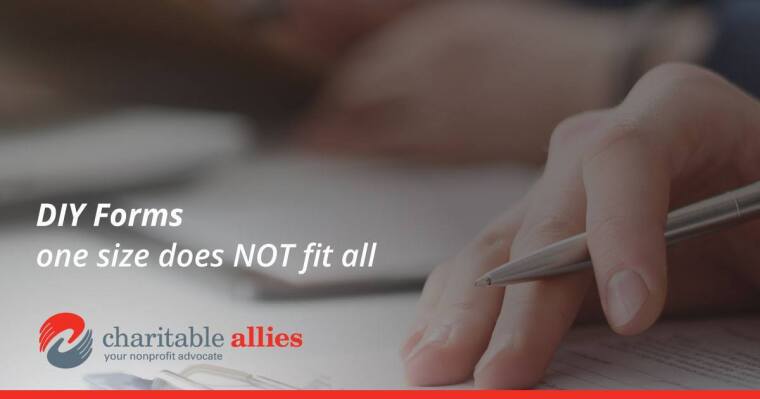Revenue down? Make Your Insurance Claim. Really.

Make and Preserve Your Insurance Claim
The COVID-19 pandemic has caused many nonprofits and businesses to see a reduction in donations and revenue or to shut down temporarily. If that's you, make your insurance claim.
I can’t stress this enough. Really. You absolutely should make and preserve your insurance claims, even if you do not think you have coverage. I’ll discuss the most common exclusions below, which your insurance agent has likely pointed out. Be sure to respond to them when your insurance company sends you follow-up questions or requests for additional information. Additionally, be very skeptical of the insurance companies’ follow-up questions.
What About Exclusions?
There are two major types of insurance policies that nonprofits typically carry for large interruptions:
- Event insurance
- Business interruption coverage
- Usually found in general business liability policies.
As you can imagine, insurance companies are freaking out about coverage. They point to one of three common exclusions as a way to get you not to file a claim:
- Physical loss
- Virus or contagion
- Pandemic
In most states, exclusions must be clear and unambiguous, and attempted exclusions are commonly interpreted against the insurance company.
Physical Loss Exclusion
Many policies have an exclusion for damage that is not covered by a "physical loss." At first glance, you might think that means some physical harm to your property, such as a tornado or flood. However, case law makes it clear in many jurisdictions that "physical loss" actually means "loss of use." After litigation, courts have held that losses for loss of use must be covered. Examples include losses due to a bad spider infestation or an asbestos insulation problem. A governmentally-ordered partial or full shutdown that results in an inability to use your property for your charitable program could very well be a “physical loss” due to the “loss of use.”
Virus or Contagion Exclusion
This exclusion typically excludes damages related to a virus. But there still may be coverage. To the extent, your nonprofit is not directly affected by the virus itself. Instead, it is affected by a shutdown order (or other slowdown related to the pandemic generally), you may be able to tap into your event or interruption insurance.
Pandemic Exclusion
A third common exclusion is a pandemic exclusion. This exclusion eliminates coverage for damage associated with a pandemic. This one will be the most difficult to contend with, but it’s at least worth looking at your policy to review the language. Interestingly, the very fact that this pandemic exclusion exists will serve as evidence that the other two exclusions–physical loss and virus or contagion–are not as broad as the insurance companies wish they were.
The TWO Insurance “Head Fakes”
Head Fake #1: Realizing they have massive numbers of claims to contend with, insurance companies have started to respond to initial claims with innocent-looking questionnaires, sometimes tucked deep in so-called “reservation of rights” letters. These questions are misleading, although you still must answer them. Remember, "physical loss" includes "loss of use," and when you reply to their questions, you need to make this very clear that this is the kind of physical loss you are experiencing.
Head Fake #2: Insurance companies and their agents are there to make money, not to take care of you. It is in the financial interest of your insurance company and your insurance agent to tell you there is no coverage. The company makes money by taking more money in premiums than it pays in claims. But what you might not know is that the rate of pay that insurance agents receive in commissions or finder's fees is often tied to the numbers of claims their clients make; the fewer claims, the better.
What if My Rate Goes Up?
Your rates can go up if you make a claim. However, in the face of this pandemic, I'd be utterly shocked if rates across the country didn't go up. Besides, what's a 10% or 20% climb in your rate as compared to possibly receiving enough funds to save your agency? And, if you ultimately don't get a payout, the rates shouldn't climb very much if the claim was unsuccessful.
What about the PPP Loan/Grant?
All nonprofits must mitigate damage. If you have received a PPP loan, and have/will use it consistent with the rules about qualified expenses, then that might slightly reduce your ultimate recovery. But that will only last so long. A recovery under your event or interruption coverage will cover a period much longer than just the 8-week PPP loan/grant.

When to Make the Claim?
Make the claim as soon as you know of a reduction in revenue. Do not wait until it is all over, and you can "total it up." Make it now and let the insurance company know you are still experiencing a loss and will have continuing damages for a time. Besides, you must notify the insurance company of the claim, and if you wait, the company may use your delay as an excuse to deny coverage for the earlier part of the timeframe.
Conclusion

These issues are complicated enough that we highly encourage everyone to seek the advice of an attorney with knowledge in insurance coverage (and who represents policy holders). We are happy to help you make a claim or perfect and preserve your claims. In some cases, we might even be able to help you bring a lawsuit against your insurance company.
Special thanks goes out to Mike Nelson, Vice President of the Charitable Allies Board, for bringing this issue to my attention and talking through coverage issues. Peter Racher and Chris Braun, Partners at Plews, Shadley, Racher and Braun, LLP were gracious enough to teach me about coverage exclusions in these policies.



